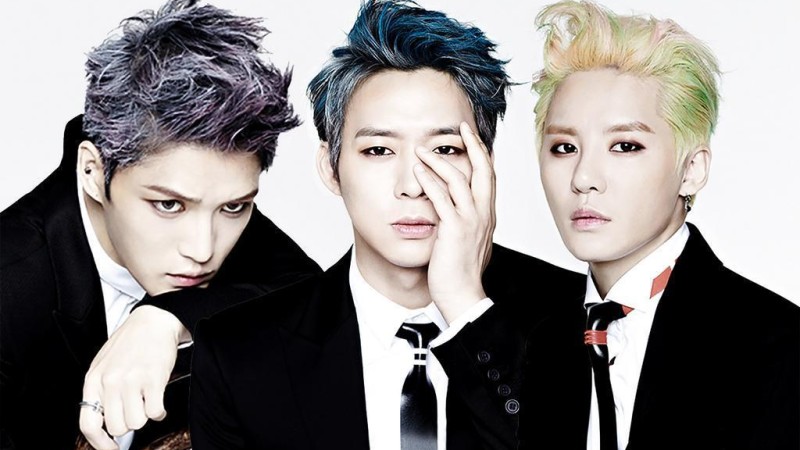With a change in law in 2015, civil cases have been made a public matter, and thus the lawsuit that ended in 2012 between SM Entertainment and JYJ has been making the rounds. That lawsuit was settled with JYJ’s contracts being cancelled and them being compensated for pay they earned back in 2009, with not much else going on. Yet, it’s being brought back up now, for whatever reason.
—–
So for starters, SME had their demand…
At the start of the case, SM Entertainment had a single demand. They wanted the JYJ members to pay back the monetary loss that was caused by JYJ refusing to participate in concerts, CFs, and other schedules from the start of the lawsuit to the end. SM Entertainment asked for 2.2 billion won in damages with 20% interest, compounded yearly, until the amount was paid off.
…and JYJ had their demands.
On the other side, JYJ had multiple demands. Their first demand was for SM Entertainment to pay them 20 million won for each time the company interfered with a JYJ member’s activity. Secondly, they claimed that the pay distribution listed in the contract was unfair, so they demanded SM Entertainment adjust the distributions and pay the JYJ members the difference. Next, they wanted SM Entertainment to pay JYJ the money that was withheld from them in 2009 after the start of the lawsuit. Lastly, they wanted 5 billion won with 20% interest, compounded yearly until the amount was paid off.
This ended in a settlement, so obviously neither side got what they wanted.
The court ultimately decided on the following 6 terms:
1. The contract between the JYJ members and SM Entertainment was valid up until July 31, 2009, when JYJ submitted their lawsuit. Once the lawsuit was submitted, JYJ and SM Entertainment were no longer legally tied via a contract.
2. The only demand from JYJ that was acknowledged was their claim for money withheld in 2009. Each of the JYJ members would receive 650 million won.
3. Both parties will withdraw their monetary damage claims.
4. Both parties will not interfere with each other’s activities.
5. Both parties will keep the ruling a secret to the public. (Invalidated with the 2015 law)
6. Both parties will pay their own lawsuit fees.
There were also things that the court ruled:
-The court determined that there was no slave contract given by SM Entertainment, and therefore no necessary payment.
-Regarding the length of their contracts, it was actually the parents of the 5 TVXQ members who agreed to extend the length of the contract from 10 to 13 years.
-The court also acknowledged SM Entertainment’s revenue distribution as fair.
-TVXQ members at the time would be paid based off of the group’s revenue, not profits.
-SM Entertainment gave each of the members a bonus when the group hit certain sales milestones.
-TVXQ had many overseas activities and concerts during their time as 5 members and the revenue split between the company and the group at the time was 70% to SM Entertainment, 30% to the members. This distribution was also deemed fair by the court.
-The members were guaranteed to be paid once an album’s sales reached 50,000.
-During the time the lawsuit was proceeding, SM Entertainment asked JYJ to not appear on broadcasts in order to reduce any risk of another lawsuit occurring, as there could potentially be hidden contracts in play. SM Entertainment did not force this on JYJ and the court agreed. The Fair Trade Commission also investigated this and found no signs of foul play.
“Boy, that sounds awful one-sided of a narrative for a settlement case!”
Well it should considering the source is a TVXQ‘s DC Inside gallery, and any recap is going to be being slanted in that direction. Regardless, media outlets are now hyping this up to be a big find for some reason (clicks, I guess), but in reality this just restates what we all knew.
—–
Look, the “slave contracts” became an issue in the Korean media long before JYJ filed suit (contract issues were nothing new even back then), it was just attached to their case because it’s a catchy headline, so there was never any slave contract at play. Technically, neither side ended up winning, and they’re using that as if it means JYJ lost or was lying.
But why would that make any sense? The result is still the same, after all. If their contracts were actually valid, then why did JYJ get the freedom they wanted instead of massive penalties for breaking a fair contract? Why did the court grant JYJ their injunction and then dismiss SME’s objection? Why were contract lengths subsequently reduced from 13 years total/10 years after debut to 7 years (among other things from the Fair Trade Commission)? Stage parents shouldn’t get the option to get scared into signing their kids away for 13 years, that’s the whole point of regulations: To protect predatory behavior of gigantic institutions against individuals.
None of that even touches on the fact that Hangeng filed his suit on the same grounds a month after JYJ were granted their injunction in court, so it’s not like this was just a JYJ thing. And if you believe the stuff about SME not interfering in JYJ’s activities, you’re beyond help (I mean, it’s ongoing).
Anyway, I wasn’t going to write about this because the story essentially rehashes a lot of stuff we already knew. However, since it started to spread, I felt it was necessary to clarify exactly what’s changed here: nothing.
 Asian Junkie Asian pop. Without discretion.
Asian Junkie Asian pop. Without discretion.
